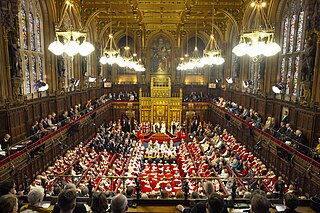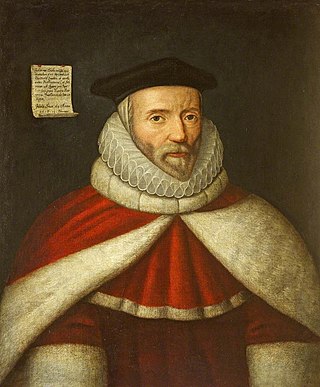
The Parliament of the United Kingdom of Great Britain and Northern Ireland is the supreme legislative body of the United Kingdom, and may also legislate for the Crown Dependencies and the British Overseas Territories. It meets at the Palace of Westminster in London. Parliament possesses legislative supremacy and thereby holds ultimate power over all other political bodies in the United Kingdom and the Overseas Territories. While Parliament is bicameral, it has three parts: the sovereign (King-in-Parliament), the House of Lords, and the House of Commons. In theory, power is officially vested in the King-in-Parliament. However, the Crown normally acts on the advice of the prime minister, and the powers of the House of Lords are limited to only delaying legislation; thus power is de facto vested in the House of Commons.

The Parliament of Canada is the federal legislature of Canada, seated at Parliament Hill in Ottawa, and is composed of three parts: the King, the Senate, and the House of Commons. By constitutional convention, the House of Commons is dominant, with the Senate rarely opposing its will. The Senate reviews legislation from a less partisan standpoint and may initiate certain bills. The monarch or his representative, normally the governor general, provides royal assent to make bills into law.

The State Opening of Parliament is a ceremonial event which formally marks the beginning of a session of the Parliament of the United Kingdom. It includes a speech from the throne known as the King's Speech. The event takes place in the House of Lords chamber on the first day of a new session, which is traditionally in November, but can occur at any time of year depending on the timing of General Elections and parliamentary session start dates. It takes place in front of a formal gathering of both Houses of Parliament. The monarch, wearing the Imperial State Crown, reads a speech that has been prepared by his or her government outlining its plans for that parliamentary year.

Sir Francis Knollys, KG of Rotherfield Greys, Oxfordshire was an English courtier in the service of Henry VIII, Edward VI and Elizabeth I, and was a Member of Parliament for a number of constituencies.

Sir John Croke was an English judge and politician who served as Speaker of the English House of Commons between October and December 1601. He also served as Recorder of London, and won the City of London constituency in his election to the 1601 parliament, being the last Speaker before the death of Elizabeth I, in 1603.
Valentine Dale was an English jurist and diplomat. He served as Judge of the High Court of Admiralty from 1584 to 1589.

Sir Francis Hastings (c. 1546–1610) was an English Puritan politician.

Sir Henry Poole was an English politician who sat in the House of Commons in 1593.

The 8th Parliament of Queen Elizabeth I was summoned by Queen Elizabeth I of England on 4 January 1593 and assembled on 19 February following. Edward Coke, the Solicitor-general and Member of Parliament (MP) for Norfolk, was appointed speaker of the commons. At the state opening of Parliament the Lord Keeper Sir John Puckering informed the house that the reasons for summoning the Parliament were the threat of Spanish invasion and the Queen's "extraordinarye and most excessive expenses". This parliament occurred in the context of an ongoing Spanish-English conflict. At the time parliament was called, the Spanish and English were in the midst of ongoing strife that began decades prior and threatened the prosperity of England. Although relations between Spain and England at the start of Elizabeth’s reign began in a largely cordial manner, the two countries came into conflict over their investments in the Americas along with religious differences; Spain was a Catholic nation while England was a largely Protestant nation. Philip II of Spain was in frequent competition with Elizabeth for influence and resources in the New World and sought to weaken England’s sway in the region. In 1582 Philip began preparing a fleet to invade England, the Spanish Armada. Three years later in 1585, Elizabeth and her government feared Philip’s growing power as his empire came “dangerously near to total supremacy in Western Europe,” which threatened the stability of Elizabeth’s rule. By 1588 the Spanish Armada had been successfully prepared for battle and began an invasion of England led by the duke of Medina Sidonia who sailed with 130 ships carrying 29,453 men in total. Their goal: overthrow Elizabeth. Ultimately, the Spanish Armada failed to defeat the British in battle and take Elizabeth’s crown, but it served as a stark reminder to England that the country was not safe from a Spanish threat. This matter of urgency was a major topic of discussion during the 8th Parliament.

The 9th Parliament of Queen Elizabeth I was summoned by Queen Elizabeth I of England on 23 August 1597 and assembled on 24 October following. The Parliament was summoned to discuss the problems of food shortages and the need for social and economic legislation to deal with the consequential social problems. The speaker was Sir Christopher Yelverton, the Member of Parliament (MP) for Northampton

The 1st Parliament of King James I was summoned by King James I on 31 January 1604 and assembled on 19 March following. It was known as the Blessed Parliament and took place in five sessions, interrupted by Holy Days and the Gunpowder Plot. The speaker was Edward Phelips, the Member of Parliament for Somerset.
Sir Robert Southwell (1563–1598), of Woodrising, Norfolk, was an English politician.

The 3rd Parliament of King Charles I was summoned by King Charles I of England on 31 January 1628 and first assembled on 17 March 1628. The elected Speaker of the House of Commons was Sir John Finch, the Member of Parliament for Canterbury.

The 1st Parliament of Queen Elizabeth I was ruled over by Queen Elizabeth I of England on 5 December 1558 and assembled on 23 January 1559. This Parliament would restore many of the laws created by Henry VIII and the English Reformation Parliament. Queen Elizabeth's 1st Parliament passed some 24 public statutes and 17 private measures by the time it was dissolved on 8 May 1559.

The 2nd Parliament of Queen Elizabeth I was summoned by Queen Elizabeth I of England on 10 November 1562 and assembled on 11 January 1563. The stated intentions of summoning the Parliament were similar to that of Elizabeth's first parliament i.e. to resolve the religious issue and to approve funds for the defence of the realm. Thomas Williams, sitting for Exeter, was elected Speaker of the House of Commons.

The 3rd Parliament of Queen Elizabeth I was summoned by Queen Elizabeth I on 17 February 1571 and assembled on 2 April 1571. The number of Members of Parliament (MPs) had grown from 402 to 438 since the last Parliament of 1559.

The 4th Parliament of Queen Elizabeth I was summoned by Queen Elizabeth I of England on 28 March 1572 and assembled on 8 May 1572.

The 5th Parliament of Queen Elizabeth I was summoned by Queen Elizabeth I of England on 12 October 1584 and assembled on 23 November 1584. The size of the House of Commons had by now increased further to 460 members, compared with only 402 in her first Parliament of 1558/9.

The 6th Parliament of Queen Elizabeth I was summoned by Queen Elizabeth I on 15 September 1586 and assembled on 15 October 1586.

The 10th Parliament of Queen Elizabeth I was summoned by Queen Elizabeth I of England on 11 September 1601 and assembled on 27 October 1601. It was to be her final Parliament.










